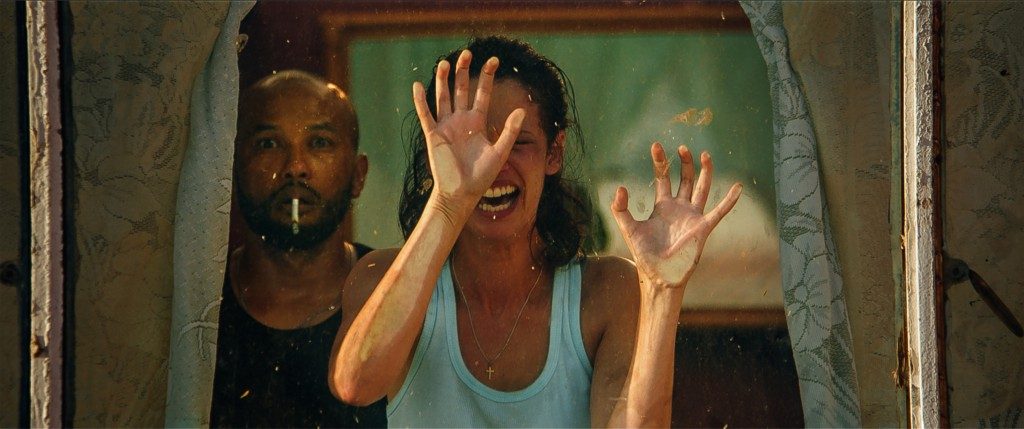Nosipho Dumisa has directed and produced award-winning short films and commercials, and has extensive television credits. Dumisa is one of the first black female feature film directors from South Africa. Television series “Suidooster” and short “Nommer 37” are among her previous credits. “Number 37” is Dumisa’s feature directorial debut.
“Number 37” will premiere at the 2018 SXSW Film Festival on March 10.
W&H: Describe the film in your own words.
ND: “Number 37” is a thriller about a down-on-his-luck paraplegic man who, when he witnesses a murder committed by a ganglord, [becomes involved in] a dangerous blackmail scheme in order to evade the sadistic loan shark he owes money to. It’s all about what can go wrong when ambition, curiosity, greed, fear, and horrific bad decision-making collide.
W&H: What drew you to this story?
ND: Having grown up watching genre films like thrillers, horror — gorging myself on them when my parents were asleep — action, and romance, it was exciting to work on a film that unapologetically explored important themes that confront us as a society today, through equally unapologetic entertainment.
W&H: What do you want people to think about when they are leaving the theater?
ND: I’d love for people to think about the things that they value and if they’re really worth all the struggle. Randal, the main character in “Number 37,” values his girlfriend more than anything but believes that money is what will make their lives better. She sees it differently: as long as they have each other, nothing else matters. In the end he has to ask himself if all that he’s risked was worth it.
W&H: What was the biggest challenge in making the film?
ND: For any independent production, time and money are the biggest challenge but with our exchange rate in South Africa, the issue is compounded so the ambitions we have for our films rarely match the budgets we have or the budgets of other independent films around the world. But to be honest, my biggest challenge was having to believe in my vision for this story even when it seemed possible that we wouldn’t be able to make it work. We shot on location in areas where the struggles portrayed on-screen actually come to life every day for people. Knowing that your presence is giving people hope, but understanding that eventually you will leave and probably lose contact with most of those people, is incredibly difficult to process and accept.
W&H: How did you get your film funded? Share some insights into how you got the film made.
ND: The film was first conceived as a short film/proof of concept that won our local film festival, which is run by one of our local broadcasters, kykNET/M-Net. When we won a few awards at the festival, the producers negotiated with the broadcaster to invest in the feature based on the success of the short. M-Net was more than happy to come on board as a major investor. In addition to this, we we raised funding against a government rebate system and Gambit Films closed the finance with an investment to back their own belief in this project.
W&H: What does it mean for you to have your film play at SXSW?
ND: When my producers, co-owners at Gambit Films, and I made this film, we were trusting that it would speak to an audience beyond our own borders because it’s such a universal story in a thrilling format. My ambition is to make films that speak to the masses without compromising on authenticity. Making it into an amazing festival like SXSW that celebrates genre films is affirmation that we did something right.
W&H: What’s the best advice you’ve received?
ND: The best advice I received came from my partners and the people I’ve been walking through life with: know your truth, believe in it, run with it, and leave the rest to God.
W&H: What advice do you have for other female directors?
ND: I’m not sure that I’m in any position to give advice, but if there’s anything I can share it’s this: what you have to say is worth being said, so fight for it no matter what.
W&H: Name your favorite woman-directed film and why.
ND: If you’ve seen my film, “Number 37” my answer may surprise you, but honestly it’s “Across the Universe” by Julie Taymor. Why? It’s the Beatles, it’s musical brilliance, it’s a visual feast. I own the soundtrack and Blu-ray and have rewatched it at least once a year since its release.
Close second and third place — not necessarily in that order — are “Big” by Penny Marshall, which I grew up watching so I’m nostalgic about it; and “City of God,” which was co-directed by Kátia Lund, will live on in my memory until the day I die — it’s one of the reasons I became interested in film at all.
W&H: Hollywood and the global film industry are in the midst of undergoing a major transformation. Many women — and some men — in the industry are speaking publicly about their experiences being assaulted and harassed. What are your thoughts on the #TimesUp movement and the push for equality in the film business?
ND: I think that it’s wonderful and important that people now feel free and empowered to speak up and say, “Enough is enough.” I look forward to the day when such discussions are no longer necessary, but this is a step towards that, and I thank the brave women — and some men — who have allowed themselves to be vulnerable in taking the hits, so that I may never have to.







